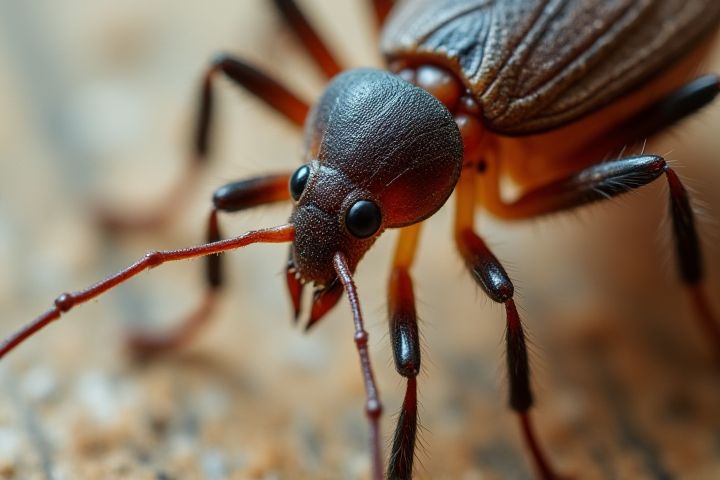
If your house is infested, first identify the type of pest invading your space, such as termites, rodents, or bedbugs, as each requires specific treatment methods. Seal all points of entry by repairing cracks and gaps in walls, windows, and doors to prevent further infestations. Focus on sanitizing your living spaces by removing food sources and clutter that attract pests. Consider utilizing traps or natural repellents as a first line of defense; however, if the infestation persists, contacting a professional pest control service may be necessary for effective eradication. Regular inspections and maintaining a clean environment will help protect your home from future infestations.
What To Do If House Is Infested
Identify the type of infestation
Identifying the type of infestation is crucial for effective pest control in your home. Common infestations include rodents, termites, bed bugs, and cockroaches, each requiring a tailored approach. Check for signs like droppings, gnawed materials, or visible insects to ascertain the specific pest problem. You may also consider consulting a pest control professional who can provide an expert assessment and recommend targeted solutions.
Seal entry points
Seal entry points to effectively combat a house infestation by pests such as rodents or insects. Inspect your home for gaps around doors, windows, and vents, which can be potential entryways. Use materials like caulk, steel wool, or weather stripping to close off these openings, ensuring a tight seal that prevents pests from accessing your living space. Regularly check for new vulnerabilities, as maintaining these barriers is crucial for long-term pest control.
Remove food and water sources
To effectively combat a pest infestation, prioritizing the removal of food and water sources is crucial. Start by thoroughly cleaning your kitchen and dining areas, ensuring that crumbs, spills, and food residues are eliminated, as even small remnants can attract pests. Store food in airtight containers, keeping pantry items secure to prevent access. Moreover, fix any leaks and ensure all water sources, including pet bowls and sinks, are dry, as pests are often drawn to moisture for survival.
Clean affected areas thoroughly
Thoroughly clean affected areas by vacuuming all carpets, rugs, and upholstered furniture to remove pests and their eggs, ensuring to dispose of the vacuum bag immediately afterward. Wash all bedding, curtains, and clothing in hot water (at least 130degF) to kill any lingering insects or larvae. Hard surfaces should be scrubbed with a mixture of warm water and detergent, followed by a disinfectant for added protection. Seal cracks and crevices with caulk to prevent future infestations, while also considering applying insecticide in strategic locations.
Use traps or baits
To effectively manage a pest infestation in your house, consider using traps or baits strategically placed in areas where you suspect activity. Choose traps designed for specific pests, such as snap traps for rodents or sticky traps for insects, ensuring they are user-friendly and safe for your household. Baits can also be effective, especially for ants or cockroaches, as they lure pests to a poison that they carry back to their colony, enhancing elimination. Regularly check and replace traps or baits to maintain efficiency and monitor the extent of the infestation.
Apply natural remedies
To effectively combat a house infestation, you can apply natural remedies that are both safe and environmentally friendly. Diatomaceous earth, a fine powder made from fossilized algae, can be sprinkled in areas where pests are present; it disrupts the exoskeleton of insects, leading to dehydration and death. Essential oils like peppermint, tea tree, and lavender act as natural repellents, with a few drops mixed in water forming an effective spray for targeted application. Regular cleaning and maintaining low humidity levels in your home can also deter infestations, as pests thrive in dirty and damp environments.
Contact a professional pest control service
If your house is infested with pests, contacting a professional pest control service is essential. These experts are trained to identify the type of infestation, assess the severity, and implement effective treatment strategies tailored to your specific situation. They use advanced techniques and environmentally safe products to eliminate pests while minimizing risks to your family and pets. By trusting professionals, you ensure a comprehensive approach that not only addresses the current problem but also helps prevent future infestations.
Use chemical treatments if necessary
Identify the pest species in your home, as different infestations require specific treatments; for example, termites might necessitate a different approach than bedbugs. If your infestation is extensive, consider using chemical treatments such as insecticides or pesticides, ensuring you follow the manufacturer's instructions for safety and efficacy. Wear protective gear and ventilate your space adequately during application, particularly in areas with high pest activity. Your ongoing maintenance, including regular inspections and cleanliness, can help prevent future infestations and maintain a pest-free environment.
Regularly monitor for re-infestation
Regularly monitoring for re-infestation is crucial in maintaining a pest-free home. Conduct routine inspections in areas where pests are commonly found, such as kitchens, basements, and attics. Pay special attention to signs of pests, including droppings, gnaw marks, and nests, which indicate ongoing activity. By staying vigilant and addressing potential issues promptly, you can significantly reduce the likelihood of pests returning to your living space.
Implement preventive measures
Implementing preventive measures is crucial in managing a house infestation effectively. Start by sealing cracks and gaps in walls, windows, and doors to limit entry points for pests. Regularly clean and declutter your home, focusing on areas like kitchens and basements, to eliminate food sources that attract insects and rodents. Utilize natural deterrents, such as diatomaceous earth or essential oils, to create an unwelcoming environment for potential infestations.
